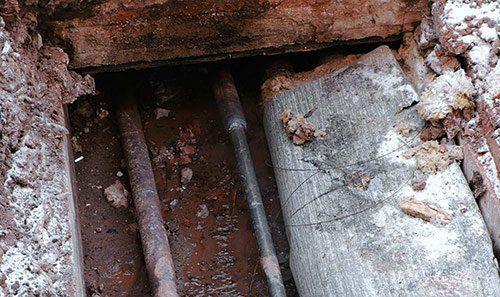The Cause sand Potential Consequences of Slab Leaks
Admin • September 7, 2018
When you picture a leak in your house, you may imagine the distinct sound of a dripping faucet or running toilet. While many of the calls you may make to an emergency plumber will concern your fixtures, drains, and so on, these are not the only areas that can be affected by water leaks.
One of the most potentially damaging leaks is known as a slab leak. In this blog, we'll explain what these leaks are, how they form, and the importance of prompt and professional slab leak repairs.
What Is a Slab Leak?
Most residential construction has a concrete foundation, called a slab, which serves as the stabilizing base for the entire building. To save interior space and prevent utility accidents, the connections to a sewage system and the municipal water supply may be integrated into the slab or placed under it during construction.
As the name suggests, a slab leak is any vulnerability in these plumbing lines that leads to water intruding under or into the concrete slab.
How Do Slab Leaks Form?
Like other types of household leaks, slab leaks come in a variety of sizes and severities from small seepage issues to torrential floods. These leaks can occur over time or may appear suddenly due to a change in plumbing conditions.
The most common causes of slab leaks include:
- Damaged piping. Any damaged pipes in a plumbing system may facilitate leaks. This damage may consist of a nick sustained during laying, wear and tear from age, or issues resulting from low-quality materials.
- Corrosion. Corrosion is one of the most common reasons slab leaks occur. This cause can affect any type but is particularly common with copper piping due to the continuous chemical interactions between the minerals in the water and the copper.
- High water pressure. When your water pressure climbs too high, it strains your plumbing system, especially in vulnerable areas such as at joints and valves. Because slab pipework controls most waterflow, high pressure will affect these pipes more than the others in your home.
- Improper installation. Small mistakes during plumbing installation can lead to leaks. For example, if the pipes are not secured, then the friction of the pipes movement can lead to punctures.
- Low water quality. Low-quality water, such as hard water, can speed up corrosion or cause obstructions in your plumbing system. These issues put additional strain on the pipes.
- Unstable ground. Sometimes slab leaks occur due to changes in the ground under a home rather than issues with the plumbing itself. Ground shifts are particularly common in soil with a high clay content.
While not technically slab leaks, leaks that occur particularly close to the perimeter of your home or in your basement can have similar effects, which we'll discuss in the next section.
Why Do Slab Leaks Require Immediate Repairs?
Initially, slab leaks can increase your water bills, make your home smell musty, or create annoying water noises. As slab leaks progress, they can cause serious cosmetic and structural damage such as:
- Foundation cracks and shifting
- Hot or cold zones in the basement or on the bottom floor
- Mold
- Plumbing line clogs
- Sinkholes and exterior flooding
- Wall cracks, water spots, or warping
- Water damaged flooring
Slab leaks often aren't immediately visible, but they do call for immediate action. Look for any warning signs that point to a water-related problem, like spongy floors or water stains.
If you think your home may have sprung a slab leak, then have the issue assessed by an emergency plumber as soon as possible. Early detection and repairs can minimize the extent and severity of the damage a slab leak inflicts on your home.
For expert slab leak repairs, trust the experienced team at Express Electrical Services.
Does your home fuse box need an upgrade? Read this blog to learn about six signs that indicate it’s time for an upgrade to protect your electrical system.
In this detailed article, we'll take a detailed look at some signs that your kitchen needs rewiring. Continue reading to find out more.
What types of electrical upgrades do you need to make before you list your home for sale? Take a look at the top electrical upgrades to consider.
There are several ways to protect your water mains and keep them in good condition. Discover three simple things you can start doing today.
Improving your office space is a great way to improve the workspace. Learn five critical services electricians offer during office remodeling projects.
A slab leak can cause more than just water damage to your home, especially in the summer. Read about the dangers of a slab leak by reviewing this blog.
As a property owner, you have certain responsibilities for the plumbing of your rental property. Learn professional tips by reading this blog.
Many homeowners have been bombarded with conflicting advice and outdated myths about plumbing. But no longer! Read our blog to learn about a few myths.
A major plumbing issue that constitutes an emergency is a water main break. Read this blog to learn about a main break’s causes, effects, and solutions.
You may be competent at fixing many home plumbing problems, but some issues require a professional hand. Here are 7 signs that indicate such a need.

